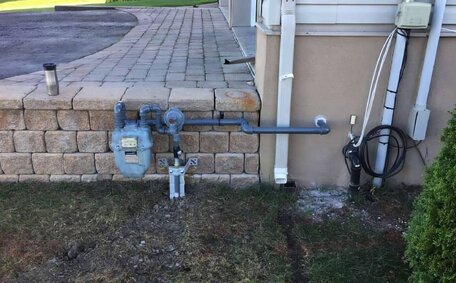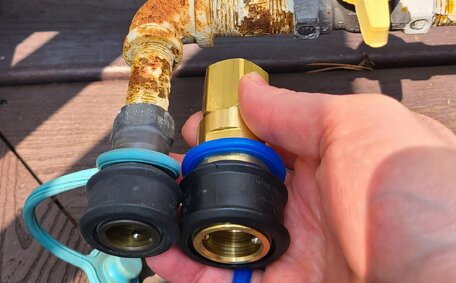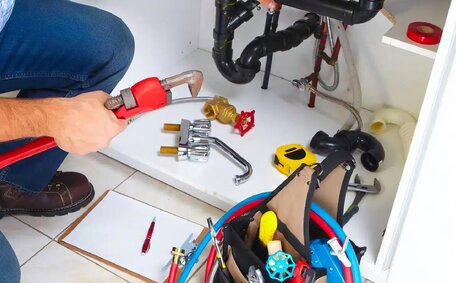Introduction to Kitchen and Bathroom Sink Blockages
Blocked sinks, a prevalent problem in both kitchens and bathrooms, can cause significant inconvenience. Understanding the differences between kitchen and bathroom sink blockages is crucial for effective troubleshooting and preventing further plumbing complications.
Your kitchen sink grapples with fats, oils, and grease which can accumulate alongside food particles inside drain pipes. On the other hand, bathroom sink clogs are often caused by hair, soap scum, toothpaste, and other bathroom products accumulating in the drain pipe.
Coffee grounds and food scraps commonly contribute to kitchen sink clogs, while slow bathroom drains are often due to things like hair, soap scum, or obstructed vent pipes.
The configuration of pipes plays a pivotal role in clearing sink clogs. In kitchens, garbage disposals can effectively grind minor obstructions. Recognising various household pipes can guide the appropriate use of drain cleaning products.
Bathroom sink drains often have p-traps that can capture debris, potentially leading to a blocked sink.
This guide will detail efficient methods to unclog kitchen and bathroom sink blockages. Learn how to prevent future issues, identify the need for professional help, and maintain your drains effortlessly with simple diagnostic steps.
Common Causes of Blockages in Kitchen Sinks
There are a host of factors at play which can lead to clogged kitchen sinks, but understanding what you can do about them is key:
- Grease accumulation - Cooking fats and oils cling to pipe walls and narrow the passage over time, making water drainage less efficient.
- Food waste - Leftover scraps, various bits of food, and even diminutive bones can get wedged in drain openings or pipes due to the presence of fats oils. Coffee remnants and eggshells have a notorious reputation for getting lodged in your kitchen basin as they can build up, leading to clogs.
- Foreign objects, such as a misplaced drain stopper, are most likely to trigger immediate blockage when items like utensils or sponges are accidentally dropped down the drain.
- Improper garbage disposal use - Overloading the disposal with food waste or not running sufficient water can cause jams due to grease oil down your drains.
- Damaged pipes - Cracks, leaks, and misalignments in pipes, affecting both kitchen and bathroom sink areas, can become blocked as debris accumulates.
- Tree roots - Roots that infiltrate exterior plumbing lines can grow into drain pipes, restricting water flow.
Prevent blockages by monitoring what enters your sink and employing drain meshes. For significant clogs, consider hiring a professional plumbing company for advanced drain cleaning once other efforts fail.
Grease Buildup
Cooking grease is a leading cause of kitchen sink blockages. Layers of grease can result in a blocked kitchen sink by building up steadily, so make sure to manage disposal to prevent impeding water flow. Even minute quantities of fatty substances can consolidate within your basin, yet prudent disposal manners can constrain the build-up at your hands.
Clogs formed by grease tend to build up over time in the trap and bend of pipes situated directly beneath the kitchen sink drain. If overlooked, the space under sink may confront severe congestion, culminating in stagnant water, ensuing unpleasant smells, or support reversals. If grease causes persistent slow draining, engaging a plumber to inspect and clear your pipes may be necessary.
To address a sink clogged with grease:
- Experience a clear water sink by refraining from emptying any concoctions of oils, grease, or fats straight into the drain. Allow cooked oils to fully cool and solidify before discarding in the trash.
- Employ drain strainers diligently to intercept oils and grease, enabling water to flow freely down your sink and not clog your pipes. This action keeps unwelcome substances from going down plughole outright.
- To maintain a clean area, use paper towels to wipe down pots, pans, and plates before washing, preventing greasy water from entering the sink.
- Minimise using garbage disposals for material likely to line the drain pipes with grease. Compost scraps when possible.
Grasping how unclog your sink using drain cleaners like a vinegar baking solution, followed by boiling water, is crucial in dissolving grease clusters in your obstructed sink. Alternatively, should domestic measures fall short, you might necessitate a call to a plumber for an exhaustive cleaning of grease-clogged pipes.
Food Waste
To prevent food waste clogs:
- Use sink strainers and/or drain catchers to keep food scraps contained.
- Avoid putting any food items down the drain. Scrape plates and dispose of food in the trash/compost instead.
- Run plenty of cold water when rinsing dishes to flush small particles down.
- Limit use of the garbage disposal for fibrous or starchy foods.
If a stubborn food clog occurs, you might need to call plumber after finding that running very hot water didn’t help dissolve the grease. Alternatively, employing drain snakes or a plunger can physically coax the stubborn obstruction to clear out if necessary. Calling a plumber to properly clear significant food clogs is recommended.
To prevent food waste clogs:
Use sink strainers and/or drain catchers to keep food scraps contained.Avoid putting any food items down the drain. Scrape plates and dispose of food in the trash/compost instead.Run plenty of cold water when rinsing dishes to flush small particles down.Foreign Objects
- Bottle caps
- Cutlery
- Sponges
- Straws
- Toys
To fend off foreign object blockages that could end up clogging your sink, employ sink drain catchers and refrain from disposing anything but water or food residue down drains. Inspect openings meticulously and can find and retrieve any dropped items straight away using pliers or magnets on a stick. For significant obstructions, pour hot water down the pipe and place a bucket under it, seeking methods to clear blockage or contemplating professional drain cleaning.
\ - Bottle caps
\ - Cutlery
\ - Sponges
\ - Straws
\ - Toys
\
Typical Sources of Bathroom Sink Clogs
Bathroom sink clogs commonly arise from:
- Hair - Strands of hair shed while brushing, washing, or shaving can clump together and block drain openings and pipes.
- Soap scum - Residues from soap hot showers, shampoos, and body wash can gradually build up in pipes.
- Toothpaste - Spitting toothpaste in sinks leads to buildup that obstructs water flow.
- Dental floss - Improperly disposed of floss gets tangled in pipes and drain traps.
To reduce bathroom sink clogs, install drain catchers, minimise hair going down the drain, Regularly pour hot water mixed with baking soda down the sink to dissolve soap scum hair, and always throw away dental floss in the trash. Calling a plumber for professional drain cleaning may be required for severe hair or soap scum clogs.
Hair and Soap Scum
Hair and soap scum are frequent contributors to clogged bathroom sinks.
Under the sink, layers of shed hair get tangled together, which is why your drain experiences blocks.
This combination of matted hair and sticky soap scum is difficult to remove and can totally block water from draining. Hair and Soap residue combined with hot water can help clear p-traps under sinks. P-traps, fittingly positioned under the sink, are the U-shaped section of piping engineered to maintain water and keep sewer gas from seeping into your home.
To keep your drains clear of hair and soap scum, install stainless steel drain screens; they are effective if used in your sink, then rinsed regularly. Protect your sinks by employing screens that snugly cover the opening and ensnare hair before it enters the drain. This can dissolve soap scum and flush some hair through pipes.
It’s also prudent to call a plumber if regular maintenance such as pouring boiling water down your bathroom sink mixed with baking soda proves ineffective.
Annual maintenance checks can do your bathroom sink a world of good, preventing severe hair and soap buildup in drains.
Plumbers have cable machines suited for both kitchen and bathroom pipes, which can snake through and break up the mass of hair and gunk. However, then can utilise professional drain cleaning with specialised tools which is often required to fully clear out a hair and soap scum clog.
Toothpaste and Dental Floss
Toothpaste and dental floss may seem harmless, but they can cause major clogs when washed down bathroom sinks.
Toothpaste contains abrasives that allow it to polish teeth. When toothpaste accumulates, it hardens and sticks to pipe interiors. Globs of toothpaste can capture hair and soap scum, creating a dense mass.
Dental floss is designed to stand up to chewing forces. But its durability also makes it resistant to breaking down when flushed.
Dental floss can twist and tangle into complex knots, complicating blockages.
Prevent toothpaste and floss clogs by disposing of them properly in the trash. Install drain screens to catch remnants, and periodically flush drains with hot water and baking soda to prevent buildup.
However, drain cleaner expertise from professionals may be required if you’re unsure about how to unclog severe toothpaste and floss issues. Drain augers can mechanically break through obstructions, while high-pressure water jets help scrub pipes clean. Proper bathroom sink care prevents annoying clogs.
Identifying a Partial vs Full Blockage
It’s important to diagnose whether you’re dealing with a partial or full blockage, as the troubleshooting steps will differ.
Signs of a partial blockage include:
- Water draining slower than usual
- Gurgling noises coming from the drain
- Sinks filling up slower than normal
With partial blockages, some water continues to drain through the clogged section of pipe. However, drainage is hampered.
Full blockages are indicated by:
- There’s no draining with standing water collecting in the sink
- Very foul sewage odours coming from the drain
Faced with thoroughly clogged passages, you’ll need to deploy more in-depth strategies since water can’t flow through the basin. Diagnosing whether it’s a partial or full clog will determine which drain cleaning methods to use.
It’s important to diagnose whether you’re dealing with a partial or full blockage, as the troubleshooting steps will differ.
\\\ - Water draining slower than usual
\\\ - Gurgling noises coming from the ough the clogged section of pipe. However, drainage is hampered.
Troubleshooting Blocked Sinks
Dealing with the challenge to specifically unblock sink can be frustrating, but there are several methods you can try yourself before enlisting a plumber:
Plunging
To dislodgs. This can displace minor clogs caused by fats and oils.
Baking Soda and Vinegar
This classic home solution is effective for breaking up clogs caused by cooking grease and other organic materials. Let it sit for 5-10 minutes then rinse with boiling water.
Administer 1/2 cup of baking soda into the drain succeeded by one cup white vinegar, leading to a vigorous purifying reaction. Cover the drain opening quickly as the mixture will fizz and bubble.
Snaking the Drain
For stubborn blockages, a wire coat hanger or drain snake can be used to manually remove obstructions.
Confronted with a profoundly obstructed sink, you might have to take out your trap section to inspect for waste clumps causing the blockage.
While these natural solutions may remedy minor clogs, for full blockages or standing water, it’s advisable to consult a plumber who has the necessary high-powered tools to remove stubborn obstructions.
Preventing Future Sink Clogs
Preventing clogs in kitchen and bathroom sinks is much easier than clearing them. Frequent habits and diligent care will help prevent the vexation of clogged basins, offering tranquillity of mind:
- Use sink strainers to catch food scraps and debris before they go down the drain
- Limit grease poured down kitchen sinks - wipe out pans first
- To preempt issues, even with your washing machine, use modest amounts of dish soap and ensure you brush and rinse hair with care to avert any potential blockages over tub or shower drains
- Avoid using sinks to dispose of food waste or chemicals
- Clean sinks regularly with hot water, using the baking soda vinegar combination
- Snake drains annually to clear built-up gunk
Installation of hair catchers and screens on all drains helps prevent blockages. Regular plumbing maintenance, like drain snaking, can help avoid the need for emergency services later on.
For advanced blockages, you may need to seek help from a professional plumber. A comprehensive hydro-jetting process can capably get job done, meticulously purifying the whole ductwork. Plumbing technicians might also conduct camera inspections to locate and assess damage within the pipes.
Take care and maintain vigilant sink care habits along with regular check-ups to avoid expensive plumbing service calls for blocked drains. Preventative measures are far more effective than reactionary drain clearing.
When to Call a Professional Plumber
While there are several DIY methods you can attempt to unclog a blocked kitchen or bathroom sink, there are times when calling in a professional plumber is the best option:
- Your sink is completely backed up with standing water
- You discover cracks or damage in your pipes or plumbing system
- The clog is deep within the main drain line
- You want to preventative maintenance to avoid future clogs
Our expert plumbers at Marsfield Plumbing possess the proficiency to tackle stubborn clogs and complex drainage issues. With hydro-jetting and mechanical snaking, we efficiently clear blockages and offer long-term solutions for any pipe damage.
For prompt and dependable service, contact Marsfield Plumbing at 1300 349 338 or jobs@marsfieldplumbingservices.com.au. We’re available 24/7 for any sink clogs or plumbing emergencies.
While there are several DIY methods you can attempt to unclog a blocked kitchen or bathroom sink, there are times when calling in a professional plumber is the best option:






